
Jake Lyell
Tou Bakary collects water from a cistern to care for seedlings in his tree nursery. The precious resource is being more equitably distributed through a water resource management plan, enabling producers throughout Burkina Faso to make a living.
The average American uses 100 gallons of water per day. In Burkina Faso, water is scarce, and the majority of the population cannot afford to waste a drop. Farmers depend on it to water their crops and nourish their livestock; families depend on it to wash clothes, cook and bathe; and everyone requires drinking water to live.
When there is not enough water and the water is poorly managed, the population is more susceptible to the consequences of droughts, floods, regional overpopulation, environmental degradation and pollution, as well as water-use conflicts.
While water is scarce, there is a way to manage water resources so that everyone has enough. And the Millennium Challenge Corporation is helping the Government of Burkina Faso do just that through investments in integrated water resource management. The Government of Burkina Faso – with MCC assistance – is drafting Water Resource Management Plans for two water basins. The plans are designed so that people will have reliable access to water while maintaining environmental standards that protect the surrounding ecosystems.
And through investments in Local Water Committees, MCC is working to ensure that everyone has a voice.
Ambroise Coulibaly, president of the Satiri Local Water Committee which is responsible for water resource management in 16 villages, says the training that his committee members have received has been a valuable tool. “Before we learned about integrated water resource management, there were a lot of conflicts between gardeners and herders. But with the training that our committee has received, we can now go out and teach the population how to share those resources.”
MCC has helped put in place 10 local water committees that work with residents to determine water needs at the sub-basin level. Through representatives, residents’ needs are then brought to the attention of the water basin committees where they are integrated into the basin planning documents. On April 30, 2014, the third revision of the Water Resource Management Plan for the Mouhoun Basin was completed by its water agency, and plans are now in place for the national government to approve the plan by July 31. Combined with user and polluter fees, government approval of the plan will make it operational. At the conference, a sign hung over the doorway which read, Water is life. Water resource management is life insurance. And nothing could better explain the goal of the Water Resource Management Plans.
Ambroise agrees that the plan will make a difference.
“The passing of the Water Resource Management Plan will solidify behavior change in many people because there will be rules on the books,” he said. “Everyone will know their roles, begin caring for the environment, and people will start seeing conflicts go away.”

